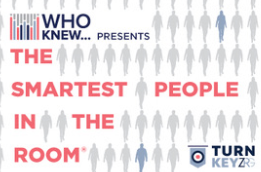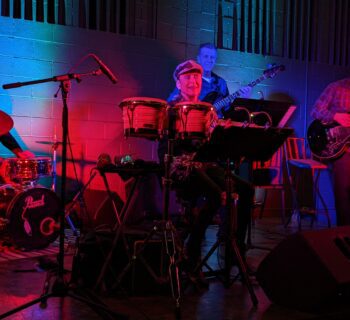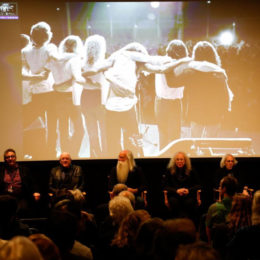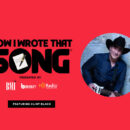Political Prose
“Music was, from the start, a way to speak up to help people believe in themselves and their power. It's the most extraordinary human form we have to love each other, to love ourselves, to connect with the most beautiful parts of being human.” – Emel
With lyrics first slipped to her by poet Amine al-Ghozzi at a music festival, Emel (born Emel Mathlouthi) first performed the folk-hymnal “Kelmti Horra” (translated to “My Word is Free” in English) at Place de la Bastille in Paris as part of an African uprising in 2007. “From that performance, things weren't the same,” she says. “It traveled, spoke to people, helped people believe in their opinions and that they deserve freedom, to speak their truth and be heard.” Initially banned by the Tunisian government for being too powerful of a message, she returned to sing in support of Arab Spring protests in 2011, going on to perform “Kelmti Horra” as part of 2016’s Nobel Peace Prize Ceremony in Norway. Touring 25 countries, holding underground performances in Iraq, (illegal) all-women shows in Iran (see "No Land’s Song," bit.ly/4ipAIH6), and performing in East Jerusalem and the West Bank in 2024, Emel received 2019’s Khalil Gibran Spirit of Humanity “Special Recognition Award” for her work.
Raised the youngest of three, listening to classical, jazz, and contemporary pop, Emel was blessed to be nurtured by free thinkers. Her father was a philosophical inspiration, her French teacher in elementary school a crucial influence, exposing her to poetry and the stage at eight years old. “That’s what started my passion for singing. I learned the songs for school by heart, she used to call me [to] help her teach, made me feel special, and supported my talent. I remember it to this day.” Songwriting by 10, Emel was tapping into her strong vocals by 15.
First pivoting to metal/rock to rebel as a teenager, Emel became inspired by the contrasting depth and simplicity of Bob Dylan and Joan Baez, and soon left metal behind. “When I encountered Bob Dylan and John Baez music, I met my soul. I left the band, learned guitar, and started performing covers. That’s how I got into protest music.”
Despite having a good fan following, opportunities in Tunisia outside the classical vein were very limited, and she moved to Paris as part La Cité Internationale des Art’s residence program in 2008. Carving her own way has brought freedom and strength to push musical and artistic boundaries. “Being in Tunisia taught me how to be a free artist because I didn't have to bend to any kind of industry,” says Emel.
Proud to be raising an independent daughter, Emel broke away from her label, recognizing her music was being promoted as cliché. “I've always fought against exoticizing Arab artists,” she says. ”I grew up with Vivaldi, Dostoyevsky, [and] English literature. There were no limits, so I couldn't understand why my music was called traditional, as if we are only bearers of tradition?” Recognizing the validation of her choices by one man’s approval, she felt incredibly hypocritical. “We’re still seeing guys and girls just hire guys. I can't run with it anymore,” she adds. “I don't want to sound like an asshole, but once you see it, you can't unsee it. It's been normal[ized] for far too long.”
With six releases since Kelmti Horra’s debut, her latest project, MRA (“woman” in Arabic), is a self-produced, all-women collaboration of international creatives. “It wasn't easy to do, and that comforted me in why I was trying to do it,” shares Emel. “The harder it got, the more stubborn I got. I didn't want to cheat any moment.”
Contact Girlie Action Media & Marketing, lydia@girlieaction.com.
Visit emelmathlouthi.com.














